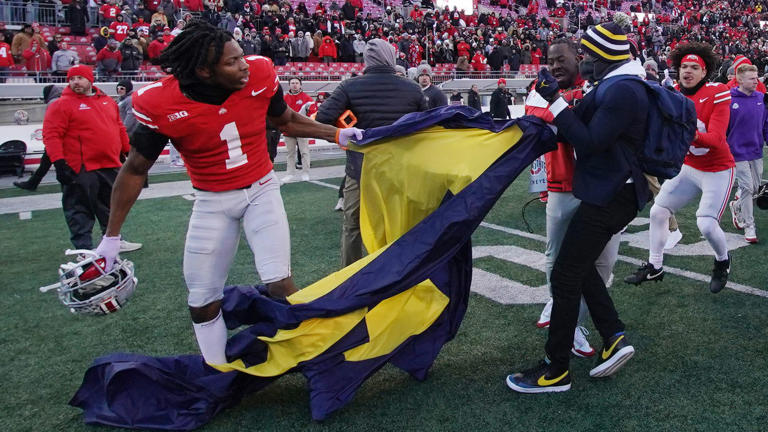When it comes to college football, few rivalries capture the imagination, stir emotions, and divide households quite like The Game—the annual showdown between Ohio State and Michigan. For over a century, this late-November classic has symbolized pride, hatred, and bragging rights for an entire region. To many fans, winning The Game is more than just a season highlight; it’s the very essence of success.
But here’s the unpopular opinion: defeating Michigan, while momentous, is ultimately less significant than winning a national championship. The emotional weight of rivalry victories can never be overstated, but in the era of the College Football Playoff and a rapidly evolving landscape, hardware matters more than hatred. It’s time to evaluate what truly defines greatness in college football.
I. Historical Significance vs. Ultimate Goal
The Ohio State-Michigan rivalry is often referred to as the greatest rivalry in sports. And rightfully so. The passion is electric. The stakes are monumental. Careers are made or broken by performances in The Game. Former Ohio State head coach John Cooper, despite compiling a 111–43–4 record, was vilified for going just 2–10–1 against Michigan. Conversely, Jim Tressel was idolized for his dominance, going 9–1 in the rivalry.
But here’s the key: rivalry wins are about legacy. National championships are about immortality. While Michigan might be Ohio State’s most hated opponent, the ultimate goal each year is to finish No. 1 in the country. A perfect season without a national title is incomplete. Urban Meyer’s 2012 Ohio State team went 12–0—including a win over Michigan—but was barred from postseason play. Ask any fan if that year felt as fulfilling as 2014, when the Buckeyes lost early but won the national title. The answer is obvious.
II. Emotional Weight Clouds Judgment
Rivalries stir emotion. They’re tribal in nature. Beating your rival feels euphoric, and losing to them is gut-wrenching. That emotional surge makes The Game seem like the be-all, end-all. For many fans, losing to Michigan (or Ohio State, from the other side) stains the entire season—no matter the final record.
But college football is a broader, national sport now. The playoff system has changed the narrative. In a 12-team CFP era, it is increasingly possible for a team to lose The Game and still win a national title. That might be anathema to purists, but it’s a fact. And when the confetti falls in January, nobody cares about the result of a November rivalry game. Championships age better than rivalry wins. No one remembers how LSU fared against Alabama in 2019 more than they remember LSU dominating Clemson in the national title.
III. Changing Landscape of College Football
Let’s address the elephant in the room: college football is changing fast. The introduction of NIL (Name, Image, Likeness), the transfer portal, and conference realignment have redefined the meaning of “success.” In this new world, coaches are judged more by playoff wins and national relevance than by old-school metrics like regional rivalries.
Michigan’s recent three-game win streak over Ohio State from 2021 to 2023 was celebrated in Ann Arbor like a revolution. But what did it ultimately produce? Two CFP semifinal losses and one national title game defeat. Compare that to Georgia, which didn’t even have a hated rival in its way but steamrolled its way to back-to-back national titles in 2021 and 2022. Which fanbase is happier today? Which team cemented its legacy?
Fans may live and die with The Game, but recruits, boosters, and national media care about banners and rings. Ryan Day, Ohio State’s head coach, has a better winning percentage than almost anyone in school history. Yet many have called for his firing because of losses to Michigan. But if he wins a national championship while losing to Michigan in the same season, will the tune change? It should.
IV. The Legacy Argument: Championships Trump Rivalries
Bo Schembechler and Woody Hayes helped turn The Game into a religion. Those battles were fierce, physical, and often decided conference titles. But again, that was the Big Ten era before the BCS and CFP. Now? National championships define legacies. No one debates who was better in the 2006 season based solely on Michigan’s close loss to Ohio State. They talk about Florida dominating Ohio State in the title game.
Nick Saban didn’t build a dynasty at Alabama by beating Auburn. In fact, he lost to Auburn in 2010 and 2013—two of the most memorable Iron Bowls ever. But he has seven national championships. Who do you think is sleeping better at night?
That doesn’t mean The Game is irrelevant. Far from it. It’s still a measuring stick, a powerful motivator, and a cultural touchstone. But when the dust settles, it’s national championships that carve statues and write history books.
V. Counterpoint: The Heartbeat of the Fanbase
To be fair, many fans will never agree with this take—and they have a strong case. For some, defeating Michigan (or Ohio State) is the spiritual climax of the season. It’s emotional. It’s communal. It’s generational. It’s about pride, not just success. For the players who grew up in-state, it’s about beating the guys they’ve heard about since childhood.
Losing to your rival, no matter how successful your season is, can feel hollow. Just ask Alabama fans in 2013, when the “Kick Six” broke their hearts even as they were favored to win the national title. Or Ohio State fans in 1996, when Michigan ruined their title hopes. In those moments, rivalry pain outweighs trophy dreams.
So yes, The Game matters—a lot. It should never be treated like “just another game.” But when evaluating significance, we have to separate emotion from outcome.
VI. The 2024 Conundrum: A Case Study
Let’s consider a hypothetical 2024 scenario: Ohio State loses a close game to Michigan in late November but qualifies for the College Football Playoff. They defeat Alabama in the semifinals and then beat Georgia for the national title. Meanwhile, Michigan, despite the win in The Game, is bounced in the first round of the expanded CFP.
Who had the better season? It’s not even close. Ohio State fans will still relish a national title parade down High Street even if they lost to Michigan. They’ll hang the banner. They’ll raise another crystal ball.
And Michigan fans? They’ll have another rivalry win, but also another empty postseason. Bragging rights fade. Trophies don’t.
VII. Looking Ahead: Evolving Priorities in the 12-Team Playoff Era
The College Football Playoff is expanding. With 12 teams qualifying, more top programs will face each other multiple times in a season. A regular season loss in The Game may be avenged in the CFP, diminishing the long-term sting. That shifts the significance even further toward championships.
Programs are going to start managing their seasons for peak performance in December and January, not just rivalry week. The stakes of The Game will remain emotionally enormous, but their practical consequences may be reduced. We’ll likely see years where both Michigan and Ohio State make the playoff, possibly rematching for the title.
In that scenario, would the November result carry the same weight? If the Buckeyes lose to Michigan but beat them in a national title game, which win matters more? The answer is obvious.



